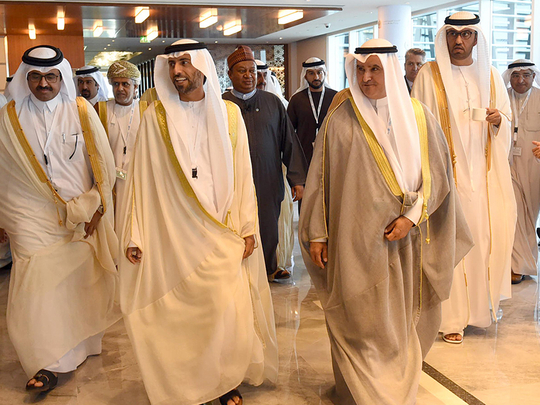
Abu Dhabi: Oil markets are on path to recovery due to measures taken by Opec and non-Opec members to cut production by about 1.8 million barrels per day from January this year, secretary general of Opec said at the third GCC petroleum media forum that kicked off in Abu Dhabi on Wednesday.
“We are optimistic that policy measures already placed us on the path of recovery. There has been a high level of compliance among oil producers to cut production and bring stability to oil markets,” said Mohammad Barkindo adding that 94 per cent compliance was recorded in February which was eight per cent higher than January figures.
“March data is showing better performance with higher conformity in line with our commitment. Our collective action will continue to prove effective and bring us results we are seeking. Both Opec and non-Opec members are committed to achieve the objective of bringing down the stock levels to bring stability to oil markets.”
Thirteen members of the Organisation of the Petroleum Exporting Countries (Opec) and 11 non-Opec members agreed to cut production by about 1.8 million barrels a day to prop up oil prices in December last year.
Opec agreed to slash output by 1.2 million barrels a day and non-Opec members led by Russia promised to cut 558,000 barrels a day.
Oil prices jumped by more than 10 per cent following the deal with international benchmark Brent crude currently trading above $55 (Dh202) per barrel.
Possibility of extension
Libya, Nigeria have been exempted from the deal as their production is affected due to internal conflicts and Iran has been allowed to increase production to pre sanction levels of about four million barrels a day.
When asked whether Libya, Nigeria and Iran would be asked to join the production cut deal if there is an extension, Barkindo said it would be premature to talk about this as the meeting is still one month away.
On the possibility of extension of the deal beyond June, he said they would meet next month to decide on this and any decision taken would be in the interest of all producers, consumers and the global industry.
“We would like to see market coming to balance and we would like to see an equilibrium of price that will encourage investors to come back not only in short cycle projects but also in the long cycle projects.”
He did not specify what the equilibrium price is but said it would be determined by the market when supply and demand converge.
Speaking to reporters at the same event, UAE Energy Minister Suhail Al Mazroui said the market is correcting itself with no huge fluctuations in oil prices.
“I am optimistic about the second half and I think if we continue to achieve what we managed to achieve, we will see better results.”
The UAE is also planning to raise production capacity to 3.5 million barrels per day by 2018, Al Mazroui added.












